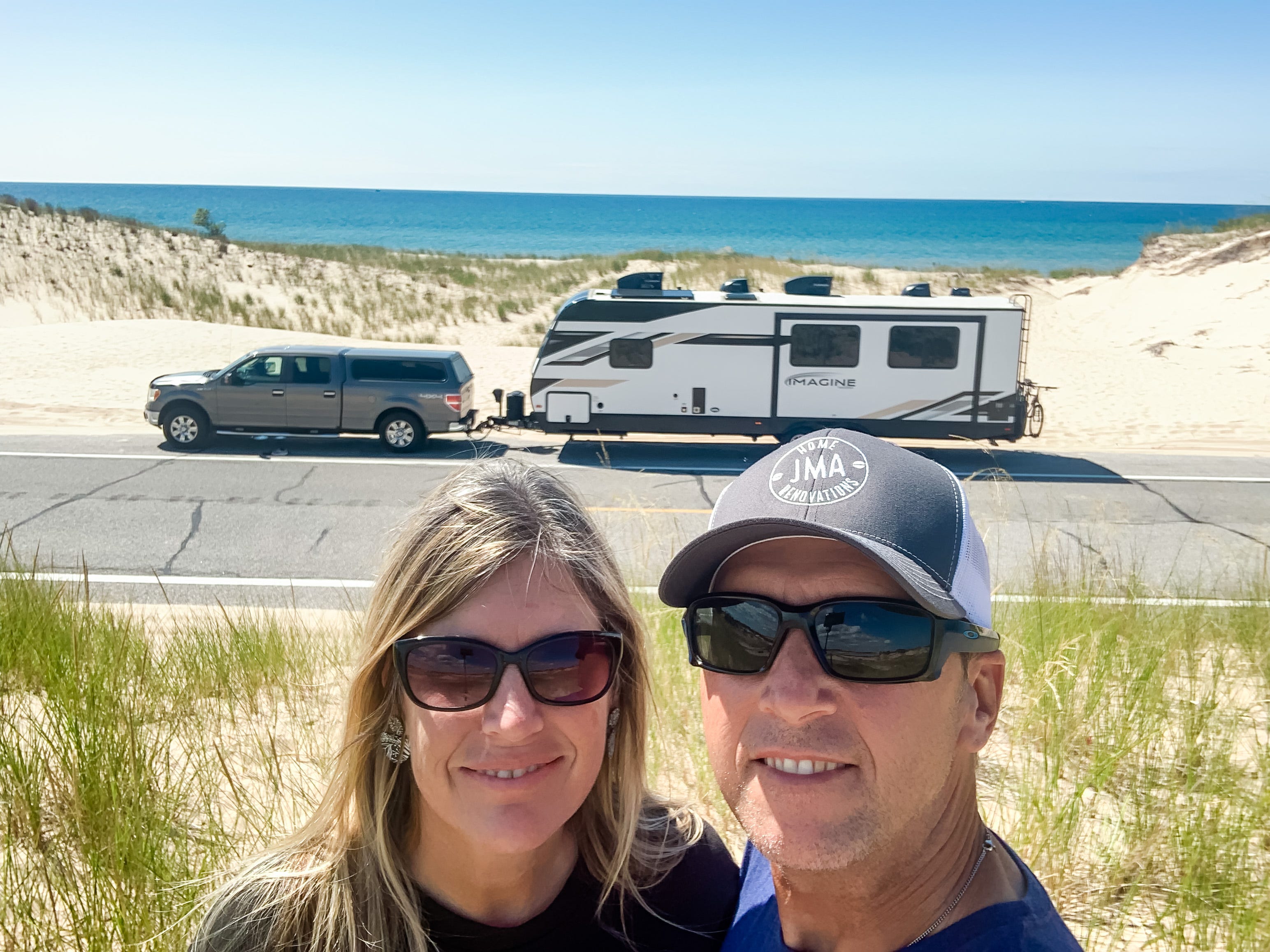
Courtesy of Laurie DuShane
Among the many places Kathy White, 66, has called home over the last decade are Mount Rushmore, New York’s Hudson Valley, South Texas, and Kentucky. The only constant has been her 30-foot Itasca Sunstar motorhome.
After White’s husband died, she didn’t have the money to take vacations, but living in her RV while traveling the country and working seasonal jobs offered a way to pay the bills and live the life of exploration that she craved.
“You’re on vacation in a way,” she said, despite working relatively low-paid jobs, mainly managing activities and administrative tasks at campgrounds and parks.
White is among many Americans living itinerant lives and paying the bills with seasonal work. So-called “work camping” has become popular among a broad swath of Americans, including retirees volunteering in exchange for an RV hook-up, Gen Z influencers pursuing #vanlife, and would-be retirees who need to fund their travel bucket list.
The lifestyle can offer a sense of freedom, but it can be logistically challenging, and isn’t necessarily cheaper than living in “sticks and bricks,” as so-called “workampers” call traditional homes.
Laurie and Matt DuShane had long dreamed of “living tiny and being able to go and see this country,” Laurie said. So the Michigan couple bought an RV in 2020 to use for short trips planned around Matt’s work schedule as a law enforcement officer. But the RV suddenly became their primary home when Matt left his job while struggling with health issues, Laurie said.
“I knew that we couldn’t continue in our current lifestyle without his income,” she said. So the couple applied for work camping jobs from Montana to California. Their first seasonal job was five months working in a campground just outside Yellowstone National Park. They did administrative work, helped orient visitors, and cleaned cabins. They quickly fell in love with the lifestyle.
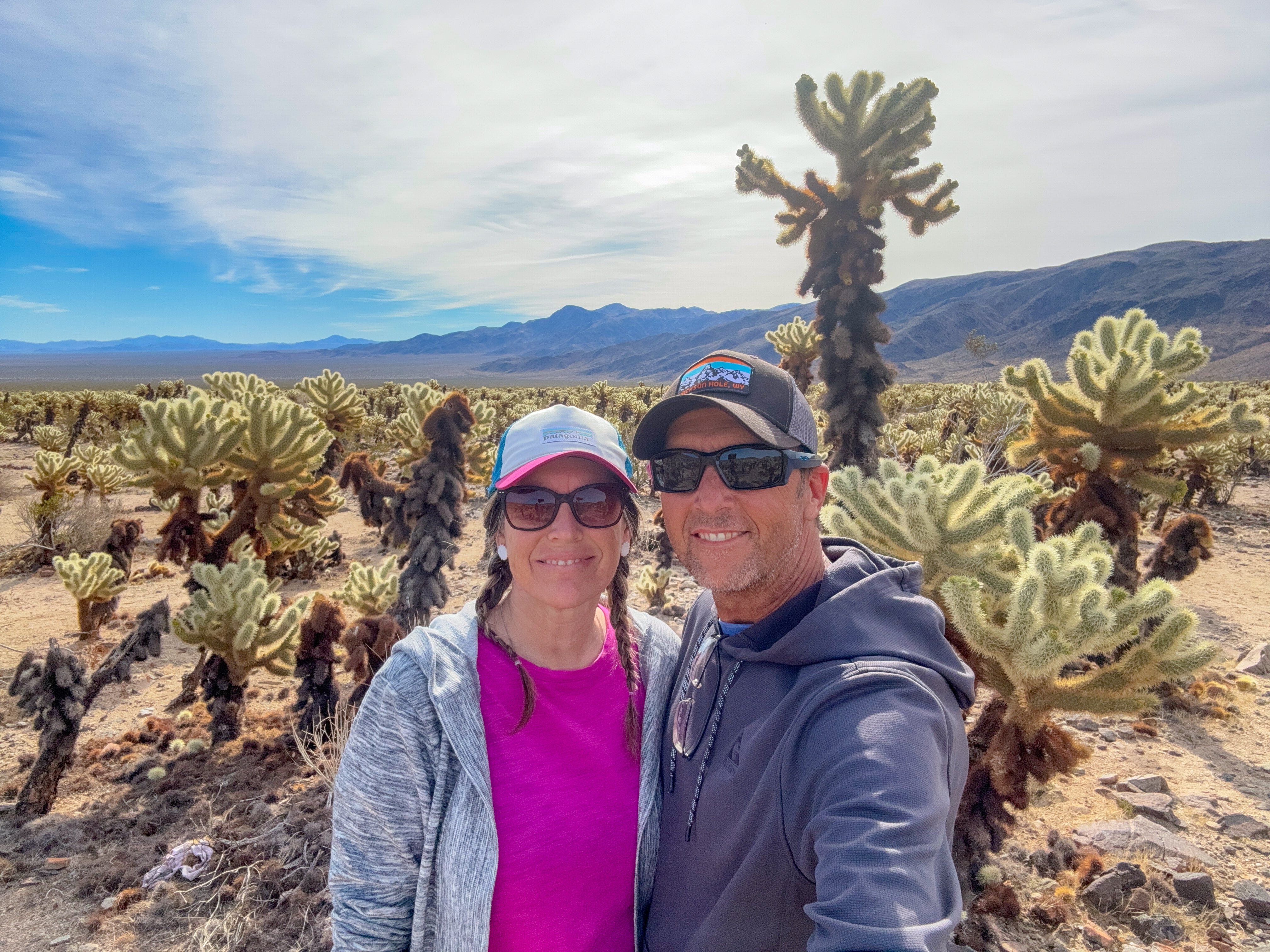
Courtesy of Laurie DuShane
“My view from the campground office was Electric Peak,” said Laurie, 51. “It was just such a world of difference” from their lives in Blissfield, Michigan.
It hasn’t always been easy. They’ve had jobs fall through weeks before they were supposed to start, leaving them scrambling for work at the last minute. Their RV has broken down, putting them in a hotel for weeks. And they’ve felt too far from their adult children at times.
“A lot of people argue in the work camping space that you can’t make good money, you don’t have health benefits, all of this stuff. Well, we don’t give up,” Laurie said. “We fight as hard as we can to find what we need to make it work, no matter the area that we’re in.”
Work camping in retirement
Many work campers are older volunteers who do work in exchange for a place to park their camper and a hookup.
Patty and Shane Gill, who are in their 50s, are among them. They sold their Texas home and most of their belongings before traveling full-time by RV. They will reach their five-year “nomad anniversary” in October and plan to maintain this lifestyle for at least the next few years.
Business Insider is covering the ways people are living outside traditional housing.
If you have a story to share, contact these reporters via email at [email protected] or [email protected] or fill out this quick form to contribute to our stories.
Read more here:
- A boomer quit nursing to live on $2,972 monthly in Social Security in an RV in America’s parks: ‘I literally live in heaven’
- A couple transformed a 20-year-old school bus into a mobile home and traveled the country’s parks: ‘It’s not for the lazy’
- A Gen X couple living in a camper says hourly wages aren’t enough to afford housing: ‘It just feels like it’s out of reach’
When their house was still for sale, a Texas campground owner offered them unpaid work positions in exchange for a free campsite and electricity. They’ve since traveled beyond the state and done more unpaid work in exchange for a free site, food, and laundry. Patty said they mainly live off Shane’s retirement money from the Air Force, but social media earnings also help cover living expenses.
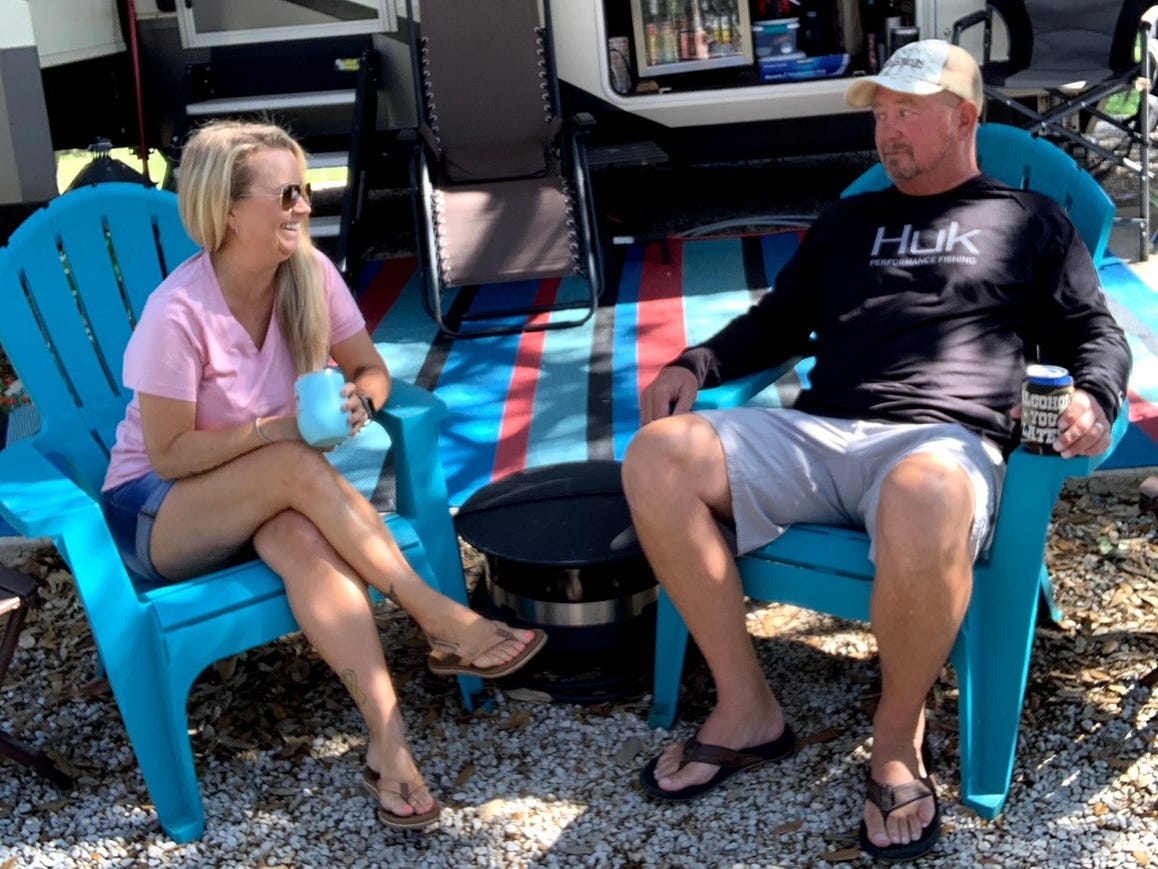
Courtesy of Patty Gill
“We will work camp for a few months, and then we go and just travel for a few months without work camping,” Patty said. “So we just kind of do a little of both now.” She loves that work camping lets her get to know an area and meet lots of new people.
Remote work opens up new opportunities
The rise of remote work since the pandemic has also opened up possibilities for camping and traveling without committing to taking relatively low-paid seasonal jobs.
Victoria Childers and Lamont Landrum Jr. have been work camping across the country since 2021, after they bought and renovated a 1992 Tiffin Allegro motorhome and sold their house in a suburb of Detroit. Their leap into RV life was made possible by Childers’ remote job as a customer success representative for a software education company.
After several months on the road, Landrum, who worked as a handyman back in Detroit, began taking paid work camping jobs, including maintenance and cleaning at campgrounds and helping with American Crystal Sugar’s annual sugar beet harvest in eastern North Dakota. But it helped to have Childers’ steady income to buoy them.
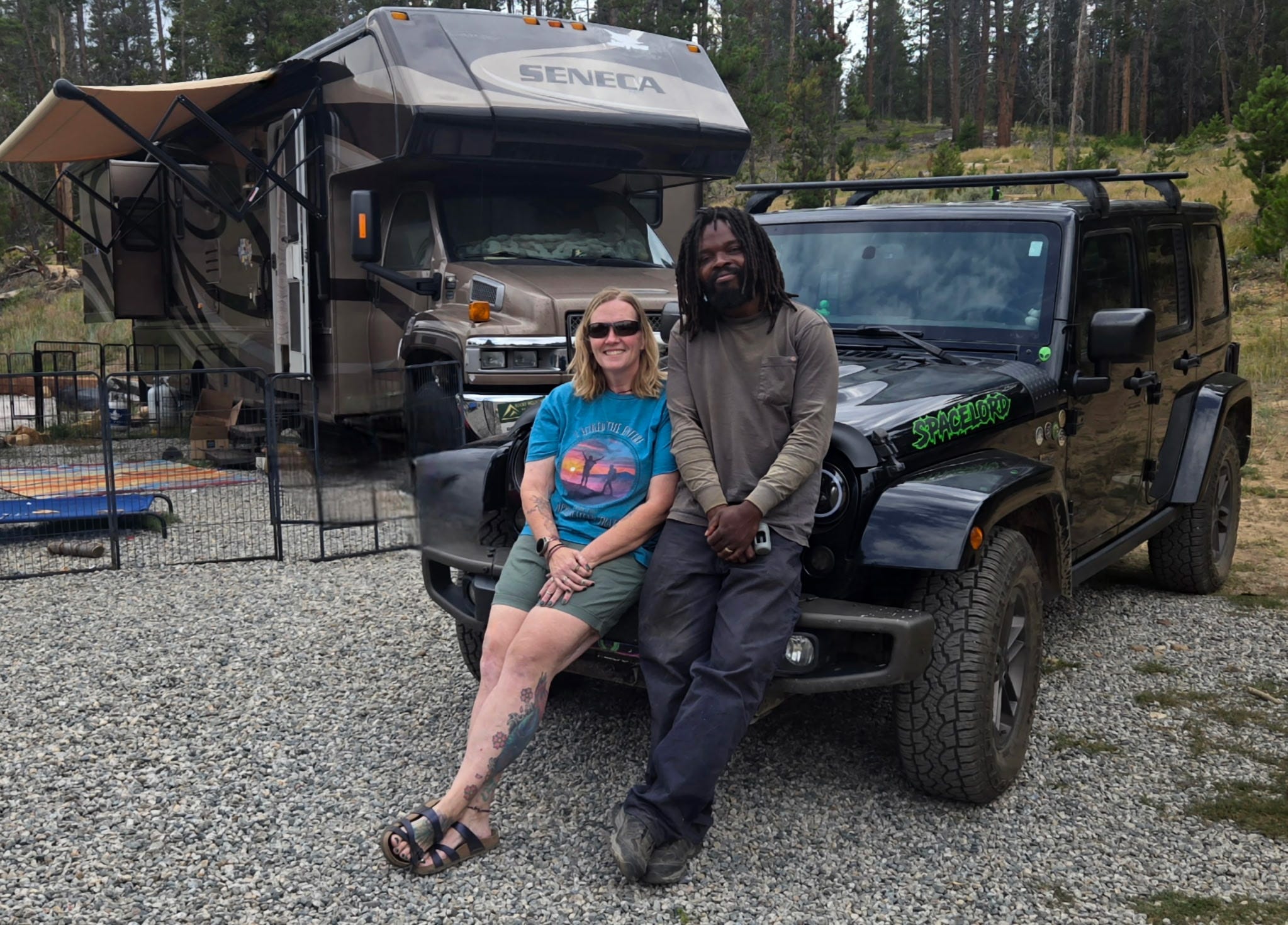
Courtesy of Victoria Childers
These days, both Childers, 50, and Landrum, 40, are working seasonal work camping jobs since Childers was laid off from her remote job in February. The couple doesn’t know whether they’ll ever be able to afford to retire, but they said work camping had given them some freedom to live their lives as they’d like to and travel places they never otherwise would.
“We get to stay in these amazing places that we could never afford for even a week, let alone staying for months at a time,” Childers said.
So far, they’ve lived and worked in a dozen different locations, some of which they’ve returned to multiple times. In early September, they’ll head back to North Dakota for their fifth consecutive beet harvest. In their free time, the couple hikes with their dogs and has gotten into off-roading in their Jeep.
“I may be working a job that I may not be exactly happy about,” Landrum said, but “I usually don’t let that affect what I’m doing after work.”
When Dave Hatton retired from 18 years as an elementary school teacher in Phoenix this past spring, he launched right into his next career as a photographer. Hatton, who just turned 60, began exploring his passion for landscape photography in the rural Southwest during the pandemic, and eventually realized that to do his best work in an affordable way, he needed to live on location.
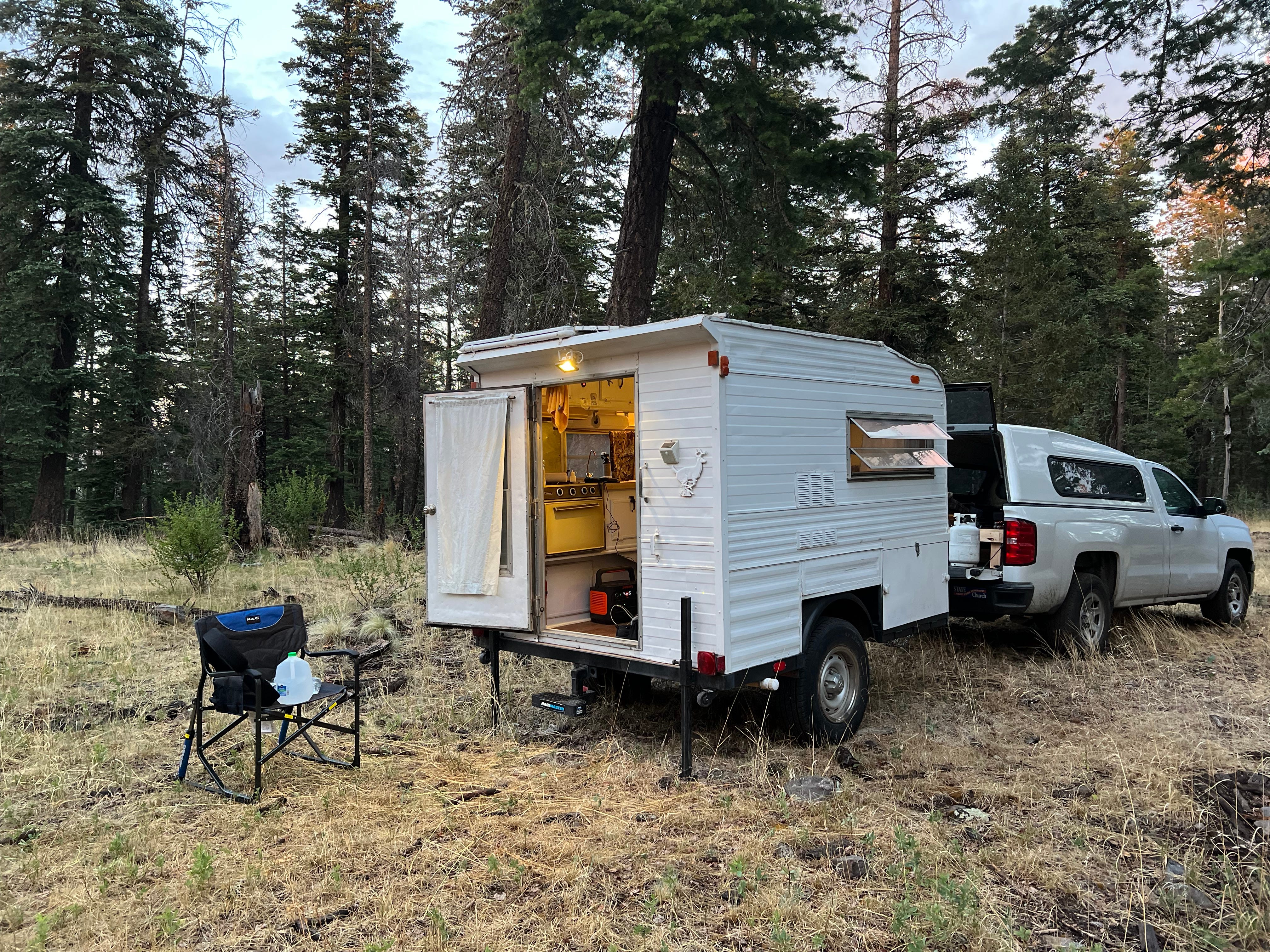
Courtesy of Dave Hatton
“I wanted to be able to be on location for days at a time, but on the teacher’s salary and on a teacher’s pension, I knew that I wasn’t going to be able to afford motels every time I went to these locations,” he said.
So he bought a tiny trailer for $2,800, and now lives in it for days or weeks at a time. Hatton sells his prints at festivals across the region, and has plans to travel farther and for longer. He wants to explore much of the West and Southwest. “I absolutely love it,” he said. But with his wife still working as a teacher back in Phoenix, he doesn’t have plans to live on the road full time.
The work camping lifestyle doesn’t come without significant challenges. And living in a tiny space and constantly traveling often gets harder in older age. And while many work-campers hope to stick to their lifestyle into their 70s and 80s, some acknowledge they’ll need to slow down at some point and perhaps find a permanent location to call home.
These days, Kathy White said she’s looking for one place, or maybe two, to settle down in. But she hasn’t found “that perfect place” yet. Her requirements are hard to meet.
“It’s gotta be somewhere warm enough in the winter but cool enough in the summer,” she said. “There are so many more places to see.”
The post Dream of quitting the corporate world? 6 work campers tell us what life is really like on the road appeared first on Business Insider.




